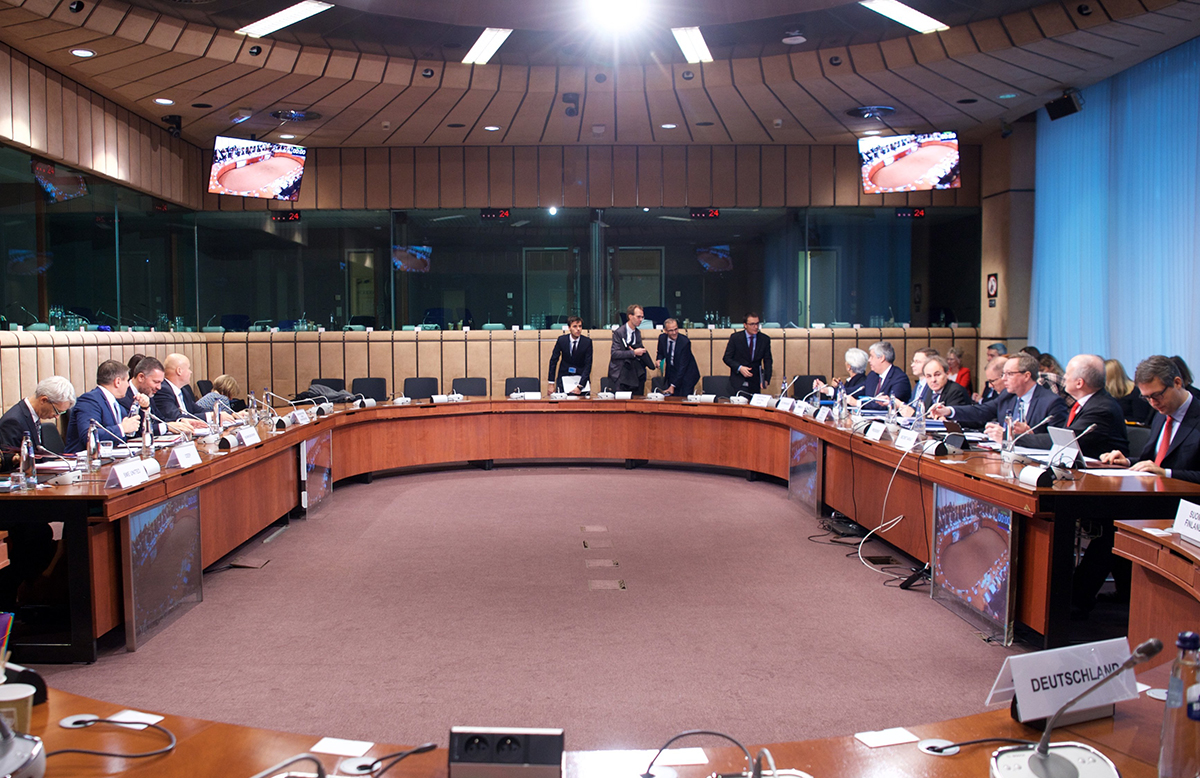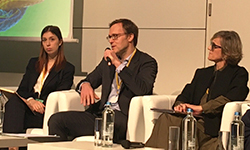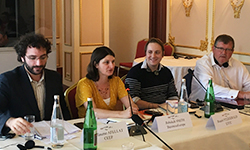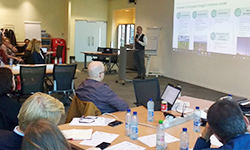BusinessEurope Headlines No. 2019-34
Autumn Economic Outlook: EU faces economic slowdown

“The EU economy is experiencing an economic slowdown that reflects uncertainties due to trade tensions, and in the event of a downturn, EU Member States should make use of the flexibility provided for in the Stability and Growth Pact to undertake appropriate counter-cyclical fiscal policy”. This was the key message from BusinessEurope Director General Markus J. Beyrer at the Macroeconomic Dialogue meeting at political level on 7 November. The Macroeconomic Dialogue provides a forum for exchanging views between the European Commission, Council, European Central Bank and social partners. Beyrer also referred to BusinessEurope’s Autumn Economic Outlook released on the same day, noting that BusinessEurope forecasts 1.3% real GDP growth in 2019 for the EU-28 and 1.2% in 2020 (down from 1.6% for 2019 and 1.7% for 2020 in our Spring forecast). The Outlook notes that the big economic question for 2020 will be how fast and with what magnitude the slowdown in export sectors affect the rest of the economy. The newly released Outlook also takes stock of the difficulty of hiring specialists with skills in Information Communication Technology (ICT) that many businesses experience. It concludes that whilst there is evidence that companies are increasing wages considerably for professions where shortages are most acute, we need a response from the educational system to address growing skills imbalances. In the USA the annual number of graduates with a degree in science, technology, engineering and mathematics has increased by almost 20% since 2013, compared to only a 1% increase in the EU.
![]() Contact: Malthe Munkøe
Contact: Malthe Munkøe
Photo copyright: European Union
Video messages
Why are large companies interested in EU funding programmes?
Watch Safran and Siemens call for a higher budget of Horizon Europe.
Why the EU-Vietnam free-trade agreement is a good idea
This year the EU and Vietnam signed two agreements on trade and investment. Company representatives tell us why they are beneficial for both countries.
Our comment
Let’s think in large scale investments and strategic value chains
By Asdin El Habassi, Adviser for Industrial Affairs
 Industrial policy has become a keyword in recent European debates on economic policy and so has the term strategic value chains. Both are strongly related to Europe’s urgent need for a more ambitious and pro-active industrial strategy. The report on strategic value chains of the Strategic Forum recently published by the European Commission, as well as the report of the Industry 2030 High Level Industrial Round Table are a welcome contribution to the debate on a more pro-active industrial strategy that Europe needs now.
Industrial policy has become a keyword in recent European debates on economic policy and so has the term strategic value chains. Both are strongly related to Europe’s urgent need for a more ambitious and pro-active industrial strategy. The report on strategic value chains of the Strategic Forum recently published by the European Commission, as well as the report of the Industry 2030 High Level Industrial Round Table are a welcome contribution to the debate on a more pro-active industrial strategy that Europe needs now.
Europe is facing unprecedented challenges that need more coordination, large scale investments, massive innovation and rapid action to turn these challenges into opportunities. Digitisation, green transition, globalisation and the acceleration of the global innovation and technological race, are going to be key determinants of tomorrow’s successful industries. Europe will be a global player if it manages to lead in industrial value chains that are key to EU competitiveness and technological leadership, e.g. batteries, microelectronics, low-carbon industries (hydrogen, CCS), cybersecurity.
To support this, we need to:
- Shape policies for entire strategic value chains rather than for individual sectors;
- Think less about legislation and more about how to support large-scale industrial projects across the EU;
- Foster cross-border cooperation and networks in order to spread benefits across the EU, rather than for the benefits of just a few.
Above all, it will be key to pool resources and public (EU and national levels) and private investments at the critical phase of moving innovation from labs to the market. This is the moment where public support may be necessary to fill the financial gap and overcome market failures.
As outlined in the recently published report on strengthening strategic value chains, a promising way forward could be the set-up of a collaborative governance structure on EU level for strategic value chains, that could support the Commission in monitoring current and identifying future strategic value chains and to advise on their development.
Of course, this more pro-active approach on value chains is not a silver bullet for a strong industrial strategy and other crucial framework conditions should not be left aside. A key instrument remains a competitive and well-functioning EU Single Market, and there is much to be done in terms of implementation and compliance, not least on services and the digital economy.
When we say Europe needs to become more pro-active and strategic than in the past, this does not imply that Europe should move towards protectionism or become inward-looking, which would be harmful for Europe. This does also not mean that it is just about reacting to what is happening in other parts of the world.
What we call for, is to ensure that we collectively deliver on what we have agreed to do. This means implementing the right reforms, taking more strategic decisions, positioning ourselves stronger in international competition and last but not least think in larger (European!) scales and strengthen our strategic value chains.
Contact: Asdin El Habassi
Business-academia collaboration is key to EU’s innovation
 “Collaboration between companies and universities remains fragmented in Europe”, said Alexandre Affre, Director for Industrial Affairs at the 8th University-Business Forum on 25 October. He explained that European business and academia often work in silos. “In a world of ever faster innovation cycles and in a moment when the global innovation race accelerates, we need to encourage collaboration between our innovative companies and excellent universities”. Affre concluded that this collaboration would be beneficial for both Europe’s economic competitiveness and sustainable development.
“Collaboration between companies and universities remains fragmented in Europe”, said Alexandre Affre, Director for Industrial Affairs at the 8th University-Business Forum on 25 October. He explained that European business and academia often work in silos. “In a world of ever faster innovation cycles and in a moment when the global innovation race accelerates, we need to encourage collaboration between our innovative companies and excellent universities”. Affre concluded that this collaboration would be beneficial for both Europe’s economic competitiveness and sustainable development.
Contact: Carolina Vigo
Business priorities on the EU’s long-term budget
 “Political leaders should demonstrate their commitment to boosting long-term growth by ensuring that the EU’s Multiannual Financial Framework substantially increases EU funding for areas such research and innovation and transport infrastructure”. This was the message BusinessEurope representatives delivered when they met on November 5 to discuss business priorities for the EU’s post-2020 long-term budget with MEP Margarida Marques, who is the Vice-Chair of the Committee on Budgets and co-rapporteur on the Multiannual Financial Framework. BusinessEurope emphasised that the European economy stands at a critical juncture as we are falling behind our global competitors in the digital and technological race, whilst our economies are entering what could become a protracted slowdown as a result of heightened trade tensions and global uncertainty. An agreement on a future-oriented EU’s Multiannual Financial Framework that has a greater emphasis on competitiveness, growth, and support Member States in implementing reforms, is essential to boosting businesses confidence that Europe is serious about supporting European growth and prosperity.
“Political leaders should demonstrate their commitment to boosting long-term growth by ensuring that the EU’s Multiannual Financial Framework substantially increases EU funding for areas such research and innovation and transport infrastructure”. This was the message BusinessEurope representatives delivered when they met on November 5 to discuss business priorities for the EU’s post-2020 long-term budget with MEP Margarida Marques, who is the Vice-Chair of the Committee on Budgets and co-rapporteur on the Multiannual Financial Framework. BusinessEurope emphasised that the European economy stands at a critical juncture as we are falling behind our global competitors in the digital and technological race, whilst our economies are entering what could become a protracted slowdown as a result of heightened trade tensions and global uncertainty. An agreement on a future-oriented EU’s Multiannual Financial Framework that has a greater emphasis on competitiveness, growth, and support Member States in implementing reforms, is essential to boosting businesses confidence that Europe is serious about supporting European growth and prosperity.
Contact: Malthe Munkøe
We need to create literacy on intellectual property
 "There is a clear need of raising awareness around Intellectual Property as many small and medium-sized enterprises (SMEs) are not sufficiently aware of the intellectual property system, the protection it can provide and the business opportunities it can open", said Elena Bertolotto, Legal Advisor for Intellectual Property (IP), at the conference for SMEs "How to use Intellectual Property to boost your business", on 30 October in Helsinki. She explained that there is the need to create an IP literacy to foster education on the IP matters, including how to commercialise knowledge-based assets. Presenting the BusinessEurope's priorities in the area of IP, she also suggested that SMEs should be supported in their enforcement efforts insofar counterfeiting piracy, unlawful transfer of technology and other unlawful practices that ultimately would deprive right holders of their legitimate rights or interfere with their ability to exercise them.
"There is a clear need of raising awareness around Intellectual Property as many small and medium-sized enterprises (SMEs) are not sufficiently aware of the intellectual property system, the protection it can provide and the business opportunities it can open", said Elena Bertolotto, Legal Advisor for Intellectual Property (IP), at the conference for SMEs "How to use Intellectual Property to boost your business", on 30 October in Helsinki. She explained that there is the need to create an IP literacy to foster education on the IP matters, including how to commercialise knowledge-based assets. Presenting the BusinessEurope's priorities in the area of IP, she also suggested that SMEs should be supported in their enforcement efforts insofar counterfeiting piracy, unlawful transfer of technology and other unlawful practices that ultimately would deprive right holders of their legitimate rights or interfere with their ability to exercise them.
Contact: Elena Bertolotto
Promoting and reinforcing social dialogue in Balkan countries
 Improving social dialogue is necessary in Balkan countries to build well-functioning labour markets that provide economic opportunities for all citizens and thus avoid the brain drain of talents. This requires strong and independent social partner organisations that work jointly with governments, in the framework of tripartite social dialogue bodies, to improve labour markets performances. Collective bargaining, at appropriate levels, should also be strengthened in these countries to foster competitiveness of enterprises and ensure good working conditions. These were some of the main messages given by BusinessEurope Social Affairs Deputy-Director Rebekah Smith during the seminar “Promoting and reinforcing social dialogue in Balkan countries”, organised by the European social partners in Belgrade on 24 and 25 October 2019. This seminar brought together social partners representatives from Montenegro, Serbia and North Macedonia and it provided them the opportunity to better understand the functioning of the European social dialogue, which is useful for countries that have started accession-talks, but also for those that are waiting for the opening of discussions.
Improving social dialogue is necessary in Balkan countries to build well-functioning labour markets that provide economic opportunities for all citizens and thus avoid the brain drain of talents. This requires strong and independent social partner organisations that work jointly with governments, in the framework of tripartite social dialogue bodies, to improve labour markets performances. Collective bargaining, at appropriate levels, should also be strengthened in these countries to foster competitiveness of enterprises and ensure good working conditions. These were some of the main messages given by BusinessEurope Social Affairs Deputy-Director Rebekah Smith during the seminar “Promoting and reinforcing social dialogue in Balkan countries”, organised by the European social partners in Belgrade on 24 and 25 October 2019. This seminar brought together social partners representatives from Montenegro, Serbia and North Macedonia and it provided them the opportunity to better understand the functioning of the European social dialogue, which is useful for countries that have started accession-talks, but also for those that are waiting for the opening of discussions.
Contact: Jessie Fernandes
Future challenges in VAT-Policy
 “Further reforms in the area of VAT should take the fast-changing digital economy into account, which blurs the line between goods and services”. This was the key message of Kristian Koktvedgaard, Chair of BusinessEurope’s VAT Policy Group, at a seminar on the “Definitive VAT-system & Future Challenges” on 24 October 2019. The seminar, jointly organised by BusinessEurope and the Confederation of Danish Industry (DI), focused on how to cope with future challenges for both businesses and tax administrations in the area of VAT. Participants, including officials from the European Commission’s Directorate-General for Taxation and Customs Union (DG TAXUD) and the Finnish Council Presidency, discussed how to modernise the VAT system to cope with the changing economy, innovative business models and the commercial reality of today. In particular, the debate centred on how a VAT-system, with a more aligned VAT-treatment between goods and services, could make the VAT system more conducive to growth and robust against fraud, but consistency and careful analysis will be essential.
“Further reforms in the area of VAT should take the fast-changing digital economy into account, which blurs the line between goods and services”. This was the key message of Kristian Koktvedgaard, Chair of BusinessEurope’s VAT Policy Group, at a seminar on the “Definitive VAT-system & Future Challenges” on 24 October 2019. The seminar, jointly organised by BusinessEurope and the Confederation of Danish Industry (DI), focused on how to cope with future challenges for both businesses and tax administrations in the area of VAT. Participants, including officials from the European Commission’s Directorate-General for Taxation and Customs Union (DG TAXUD) and the Finnish Council Presidency, discussed how to modernise the VAT system to cope with the changing economy, innovative business models and the commercial reality of today. In particular, the debate centred on how a VAT-system, with a more aligned VAT-treatment between goods and services, could make the VAT system more conducive to growth and robust against fraud, but consistency and careful analysis will be essential.
Contact: Pieter Baert
Calendar
- 12-13 November: Healthy Workplaces Summit
- 13 November: Presentation of BusinessEurope’s priorities for the institutional cycle 2019-2024
- 14 November: Innovative, collaborative, regional: smart intellectual property for a competitive Europe
- 25-27 November: SME Assembly 2019
Reminder: please have a look at our privacy policy